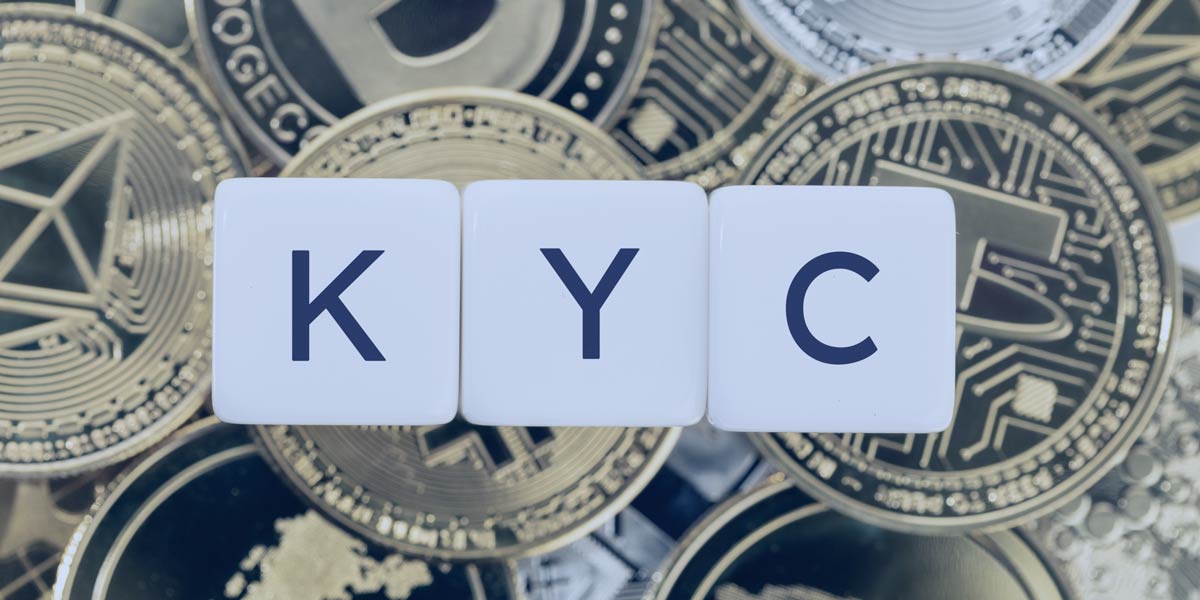Cryptocurrencies promise speed, decentralization, and the allure of anonymous transactions. But let’s be real – crypto isn’t all sunshine and rainbows. With high-value transactions and the irreversible nature of crypto funds, the risk of fraud is a significant concern.
Did you know that in 2022 alone, there were 120 well-known instances of crypto fraud, resulting in a staggering $2.1 billion in stolen funds? According to Coin Journal, that’s a 28% increase from the previous year. So, it’s no surprise that crypto companies are ramping up their KYC measures to stay ahead of the curve and protect you, the user.
But what is KYC in crypto? KYC, or “Know Your Customer,” is a cornerstone in the financial system that helps keep things transparent and secure. If you’ve ever used a crypto exchange, you’ve probably completed a KYC verification process. These checks are essential for crypto services to comply with anti-money laundering (AML) regulations and to mitigate risks like money laundering and terrorist financing.
While KYC and AML regulations are here to stay, they sometimes clash with the crypto ethos of decentralization and anonymity. It’s a fascinating tension, one we’ll explore in depth in this guide.
What Does KYC Even Mean?

“Know Your Customer (KYC),” is a series of checks that help financial services confirm you are who you say you are. Think of it as a digital handshake between you and the financial system.
The KYC process aims to do a few important things:
- Verify your identity (the “know your customer” part).
- Ensure your source of funds is legit.
- Assess the money laundering risks tied to your financial transactions.
Now, KYC isn’t a new kid on the block. It’s been around since the 1990s in the United States, initially introduced to combat money laundering. The requirements can vary, from just your name and email to more robust identity verification like photo IDs and proof of address.
Why is KYC such a big deal, especially in the crypto space? Well, let’s take a trip down memory lane.
Remember Liberty Reserve? Founded in 2006, this digital currency platform was a haven for all sorts of shady activities, thanks to its lax KYC measures. It was eventually shut down in 2013 after laundering a jaw-dropping $6 billion from criminal activities like identity theft and credit card fraud.
The founder, Arthur Budovsky, was sentenced to 20 years in prison, and the case became a wake-up call for the crypto industry.
So, KYC is more than just a bureaucratic hurdle; it’s a crucial tool that helps keep the crypto market secure and compliant with financial regulations.
Why Does Crypto Need KYC? What is KYC in crypto?

You might wonder, “If crypto is all about decentralization and freedom, why do you need KYC?” Great question! The answer is multi-faceted, but let’s break it down.
Firstly, KYC helps improve the public image of the crypto market. Let’s face it, crypto has had its share of bad press, often linked to money laundering and other unsavory activities. The industry can shake off some of these negative associations by implementing KYC measures, paving the way for broader adoption and investment.
Secondly, crypto KYC is a powerful tool against malicious activities like ransomware attacks. In 2020 alone, victims shelled out nearly $350 million in crypto to attackers who exploited the anonymity of digital currencies. KYC can help trace these transactions and bring the bad actors to justice.
But it’s not just about catching the bad guys; it’s also about staying on the right side of the law. In many places, KYC is not just a good practice; it’s a legal requirement tied to AML (Anti-Money Laundering) and CFT (Counter Financing of Terrorism) regulations. Failure to comply can result in hefty fines and even jeopardize licenses for crypto exchanges and other financial service providers.
Moreover, KYC serves as a protective shield for the financial ecosystem. It helps prevent not just money laundering but also terrorist financing and various types of fraud. This creates a safer environment for everyone involved, from individual investors to large financial institutions.
Lastly, KYC builds trust. If you’re new to the crypto space and a bit hesitant, knowing that a platform has stringent KYC checks can be the assurance you need to take that first step. It’s like a trust badge that says, “You’re in safe hands here.”
So, while KYC procedures might seem like a hassle, it’s necessary to benefit everyone in the crypto universe. And in the end, isn’t that what we all want?
Where You’ll Bump into KYC in the Crypto Universe
If you’re navigating the crypto universe and wondering where KYC will pop up. Well, it’s more common than you might think and not just limited to crypto exchanges.
First, if you use custodial crypto wallets like CoinPayments to store your digital assets, expect to go through some KYC measures. Crypto wallets are like your personal bank for crypto, and just like traditional banks, they want to know who’s depositing and withdrawing funds.
Then there are peer-to-peer (P2P) marketplaces. These platforms connect buyers and sellers directly. They also usually require KYC. It’s their way of ensuring the person you’re trading with isn’t up to anything sketchy.
Ever heard of OTC (over-the-counter) trading? These platforms are especially popular for trading larger sums of crypto. They connect you directly with a counterparty, bypassing the public auction system. And yes, they’ll want to know who you are before you start trading.
Crypto lending platforms are another area where you’ll encounter KYC. These platforms let you borrow funds using your cryptocurrency as collateral. It’s a nifty service, but they’ll want to verify your identity first, mostly to assess your risk profile.
Crypto Payment processors like CoinPayments are also on the list. If you’re a merchant looking to accept crypto payments, you must go through KYC. It’s a way to ensure that the crypto transactions are above board.
And let’s not forget token sale platforms. These platforms help crypto-related companies raise funds by selling tokens. If you’re looking to invest in the early stages of a crypto project, be prepared to go through KYC.
It’s not just the type of service that dictates the need for KYC compliance. Two major factors come into play:
- The jurisdiction where the crypto firm operates
- and the volume of funds it handles.
Different countries have different KYC regulations (e.g. UK has its own specific regulations), and the larger the financial transactions, the stricter the KYC requirements tend to be.
So, as you can see, KYC is pretty much everywhere in the crypto space.
How Does KYC Work in Crypto?
KYC identity verification process is where you share some basic details about yourself – name, date of birth, and address. You’ll also show some government-issued ID to prove you’re really you.
Once you’re in the KYC loop, the crypto service starts doing their homework. They’ll cross-reference your personal information to make sure everything checks out. This involves a few key steps:
- Confirming your identity – making sure you are who you say you are.
- Verifying your activities and the legitimacy of your funds.
- Creating a risk profile based on Anti-Money Laundering (AML) factors like what you’re up to and where you’re located.
How Web3 is Changing the KYC Game
The crypto community values privacy. The idea of revealing your identity and location, also known as doxxing, isn’t exactly appealing to most. Web3 is offering a fresh take on KYC that’s more in tune with the ethos of the crypto space with multiple options around Decentralized Identities (DiDs)
Companies like Civic, based in San Francisco, are pioneering this new approach. They have products called Civic Pass, which focuses on verifying the uniqueness of your identity in the Web3 environment and Civic.me, a one-stop-shop on the blockchain where you can manage everything from your online identity to your NFTs and wallet addresses.
And Civic isn’t alone. Other projects like Polygon with its Polygon ID, Astra Protocol, and Parallel Markets are also jumping into the Web3 KYC arena. They’re all aiming to make the customer identification process as smooth as possible, while still keeping compliance in check.
So, while KYC might be a bit of a hot topic in a community that cherishes privacy and permissionless transactions, it’s not going anywhere. Governments are getting more curious about crypto and Web3, and as these worlds continue to collide with the legacy financial system, KYC will remain a constant. But thanks to Web3, it might just become a process we can all get behind.
Now that you know what is KYC in crypto, let’s dive into the most frequently asked questions about it.
Frequently Asked Questions
Is KYC Safe in Crypto?
Absolutely, KYC is a safeguard against financial crimes like money laundering. It helps crypto exchanges maintain a secure environment by vetting users through personal information. But remember, no process is foolproof.
Can You Buy Crypto Without KYC?
Some crypto exchanges do allow limited transactions without KYC, often capping the amount you can withdraw. Decentralized exchanges (DEXs) usually don’t require KYC, as they’re not considered financial intermediaries under most laws.
What Are the Regulatory Risks of Not Complying with KYC for Businesses?
Skipping KYC can lead to legal challenges and hefty fines, as it’s a violation of AML and CFT legislation. Regulatory compliance is crucial for both crypto firms and financial institutions.


